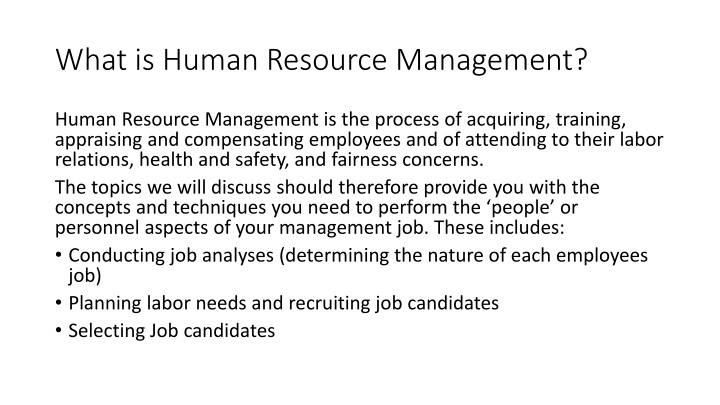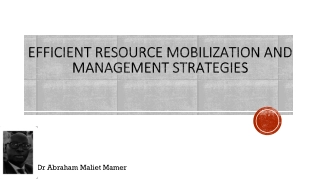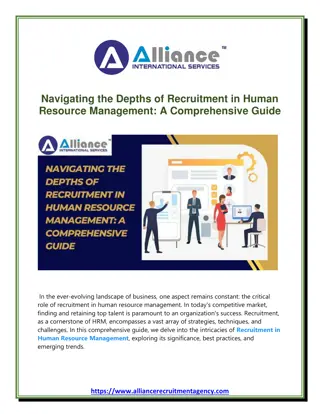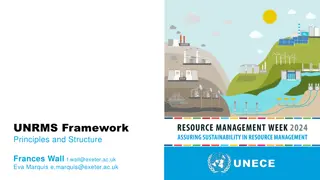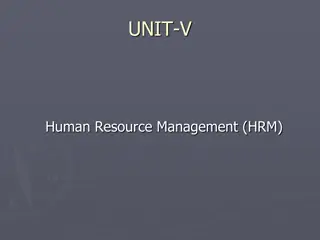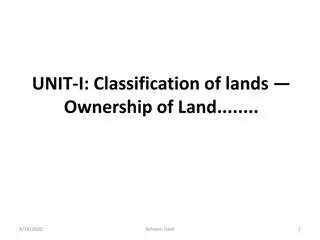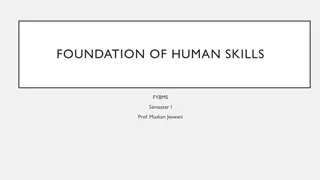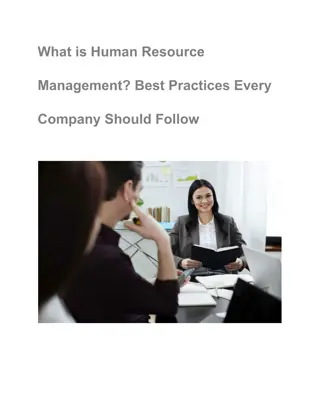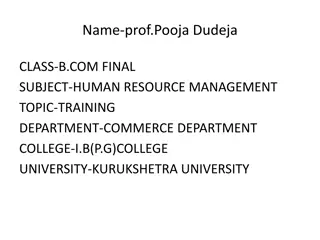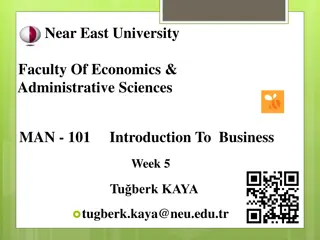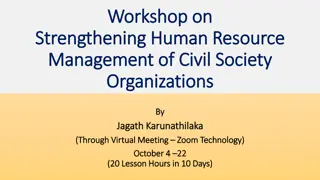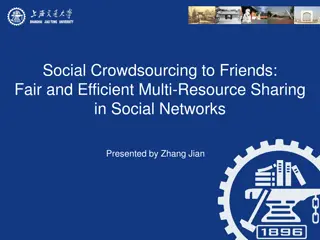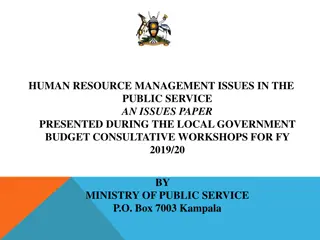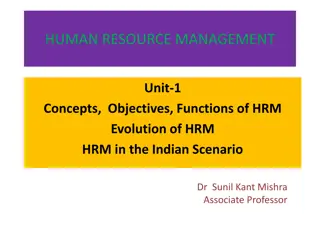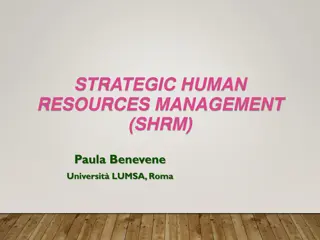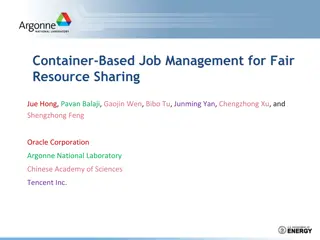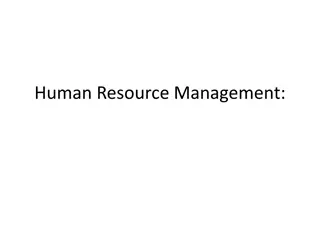What is Human Resource Management - Essential Concepts and Techniques
Human Resource Management encompasses acquiring, training, and compensating employees while managing labor relations, health, safety, and fairness. This involves job analyses, recruiting, employee orientation, performance appraisal, and more. Understanding HRM is crucial for avoiding personnel mistakes and legal issues.
Download Presentation

Please find below an Image/Link to download the presentation.
The content on the website is provided AS IS for your information and personal use only. It may not be sold, licensed, or shared on other websites without obtaining consent from the author.If you encounter any issues during the download, it is possible that the publisher has removed the file from their server.
You are allowed to download the files provided on this website for personal or commercial use, subject to the condition that they are used lawfully. All files are the property of their respective owners.
The content on the website is provided AS IS for your information and personal use only. It may not be sold, licensed, or shared on other websites without obtaining consent from the author.
E N D
Presentation Transcript
What is Human Resource Management? Human Resource Management is the process of acquiring, training, appraising and compensating employees and of attending to their labor relations, health and safety, and fairness concerns. The topics we will discuss should therefore provide you with the concepts and techniques you need to perform the people or personnel aspects of your management job. These includes: Conducting job analyses (determining the nature of each employees job) Planning labor needs and recruiting job candidates Selecting Job candidates
What is Human Resource Management? Orienting and training new employees Managing wages and salaries(compensating employees) Providing incentives and benefits Appraising performance Communicating (interviewing, counseling and disciplining) Training and Developing Managers Building employee commitment
And What a Manager should know about: Equal Opportunity and Affirmative action Employee health and safety Handling grievances and labor relations
Why is HRM important to all managers? These concepts and techniques important to all for several reasons AVOID PERSONNEL MISTAKES First having a command of this knowledge will help you the sorts of personnel mistakes you don t want to make while managing. For example no managers want to: Hire the wrong person for the job Experience high turnover Have your people not doing their best Waste time with useless interviews
Have your company taken to court because of your discriminatory actions Have some employees think their salaries are unfair relative to others in the organization Allow a lack of training to undermine your departments effectiveness Commit any unfair labor practices
Line and Staff aspects of HRM All managers are, in a sense, Human Resource managers, because they all get involved in recruiting, interviewing, selecting and training their employees. Yet most firms also have human resource departments with their own top managers. How do the duties of this human resource manager and department relate to the human resource duties of sales and production and other managers? Answering this requires a short definition of Line versus Staff Authority
Authority : Authority is to right to make decisions, to direct the work of others, and to give orders. Managers usually distinguish between Line Authority and Staff Authority Line Authority: Line Authority traditionally gives managers the right to issues orders to other managers or employees. Line Authority therefore creates a superior (order giver) subordinate (order receiver) relationship.
Line Managers Human Resource Duties Introduction : Line Managers still have many human resource duties. This is because the direct handling of people has always been part of every line managers duties, from president down to first-line supervisors responsibilities for effective human resource management under these general headings: Placing the right person in the right job Starting new employees in the Organization (Orientation) Training employees for jobs that are new to them Improving the job performance of each person
Gaining co operation and developing smooth working relationships Interpreting the company s policies and procedures Controlling labor costs Developing the abilities of each person Creating and maintaining department morale Protecting employees health and Physical condition In small organizations, line managers may carry out all these personnel tasks unassisted. But as the organization grows, they need the assistance, specialized knowledge, and advice of a separate human resource staff. The HR department provides this specialized assistance.
Human Resource Managers Duties In providing this specialized assistance, the human resource manager carries out three distinct function: A Line Function A Coordinative Function Staff (assist and advice) A Line Function: The Human Resource Manager directs the activities of the people in his or her own department, and perhaps in related areas
A Coordinative Function : The Human Resource manager also coordinates personnel activities, a duty often referred to as functional authority (or functional control) Here he or she ensures that line managers are implementing the firms human resource policies and practices( for example, adhering to its sexual harassment policies) Staff (assist and advice)Function: Assisting and advising line managers is the heart of the human resource managers job. He or she advices the CEO so the CEO can better understand the personnel aspects of the company s strategic options , HR assist in hiring ,training, evaluating, rewarding, counseling, promoting and firing. It administers the various benefits programs( health and accident insurance, retirement , vacation and so on).
It helps the line managers comply with equal employment and occupational safety laws, and plays an important role in handling grievances and labor relations. It carries out an innovator role, up to date on current trends and new methods for better utilizing the company s employees (or human resources) it plays and employee advocacy role, by representing the interest of employees of within the framework of its primary obligations to senior management Although human resource managers generally can t wield line authority( outside there departments),they are likely to exert implied authority . This is because line managers knows human resource manager has top management ear in areas like testing and affirmative action.
The size of the human resource department reflect the size of the employer. Examples of human resource management specialties include: Recruiters : Search for qualified job applicants Equal Employment Opportunity (EEO) Coordinators: Investigate and resolve EEO grievances, examine organizational practices for potential violations and compile and submit EEO reports Job Analysts : Collect and examine information about jobs to prepare job descriptions
Compensation Managers : Develop compensation plans and handle the employee benefits programs Training specialists : Plan, Organize and direct training activities Labor relations specialists : Advise management on all aspects of union management relations
